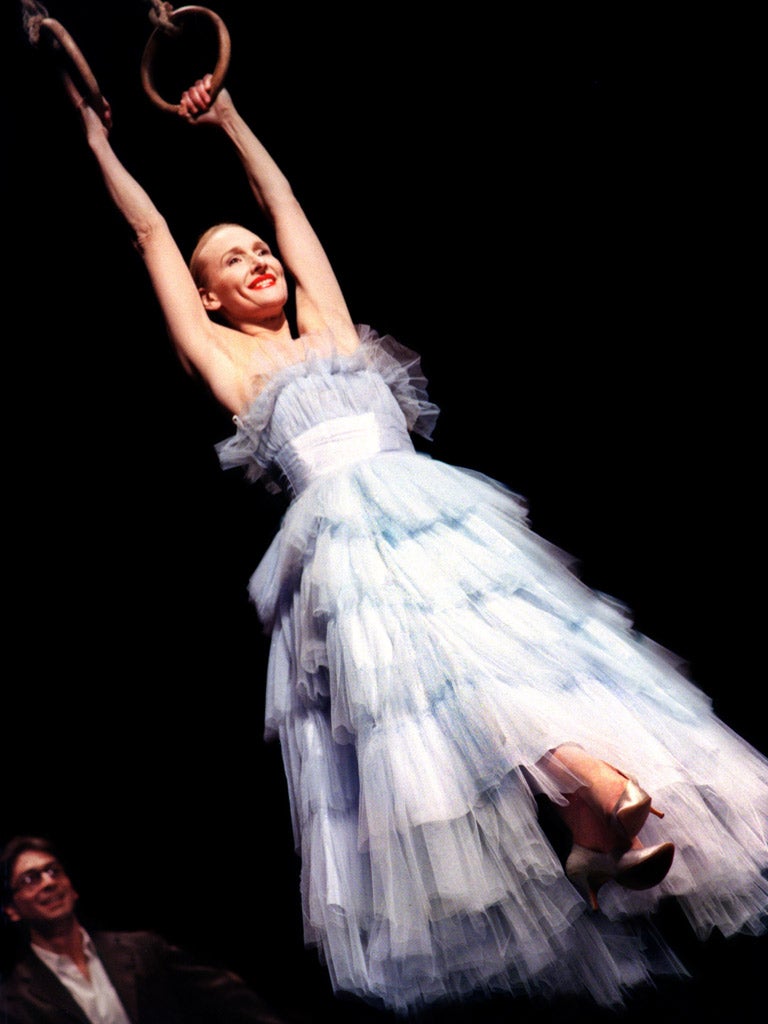Pina Bausch: World Cities, Sadler's Wells & Barbican Theatre, London
What better way to celebrate the Cultural Olympiad than by staging the late, great Pina Bausch's searching, spectacular portraits of 10 world cities?

Describing the late Pina Bausch as a choreographer is a bit like calling a unicorn a kind of horse – not untrue, just inadequate. She was an animator, a conjuror of stage pictures, a prober of human experience, who just happened to use dancers to get her effects. Art-house film directors such as Pedro Almodovar and Wim Wenders (whose documentary Pina has vastly widened her audience) were in thrall to her because she dealt in their currency. Her work – with its tapestry of surreal sight gags and scraps of dialogue, its mass synchronised set-pieces, its concern with extremes of pleasure and pain, the epic stage settings that appear to bring the outdoors in – has the scale of grand opera and the dream-quality of Fellini's films.
World Cities, a month-long season of 10 Pina Bausch productions created between 1986 and her death in 2009 in response to locations around the globe, opened with the earliest and fiercest. Viktor is a postcard from Rome, a city seen as sexist, venal, and slowly suffocating under the silt of history. The action takes place within a towering 15ft earthwork, from the rim of which a gravedigger relentlessly shovels soil on the people below. When Viktor was first shown in London, in 1999, it was, as I remember, dirtier, and the soft patter of earth hitting the stage more sinister. Thus do the practical demands of touring take their toll.
Even so, Viktor delivers a potent, multi-layered experience, albeit one drawn out over almost three and a half hours of variable intensity – though I'm willing to believe that even the stretches of tedium are intended, in that they mimic the true rhythm of life. Corpses are everywhere, most obviously in the deceased bride and groom over whom the priest intones the marriage service, rolling their bodies together on the floor for a kiss. An invalid on his deathbead squanders his last breath on apoplectic requests for coffee. Women are bundled about like stiffs – but they could equally be shop mannequins. Bausch's images are often multi-purpose. When two men pour quantities of water into a woman's mouth and then bathe in it as she spurts it out, it's at once a reference to Rome's famous fountains, to the Roman male's unquestioning sexual domination, and his obsession with personal grooming.
But it's not all bleak. Pleasure, when it comes, is intense: women in ballgowns swung through the air to 1930s love songs; a crocodile of rapt couples in an intimate social dance; women buttering bread rolls which they feed to the audience. Community, sex, death ... the impressions pile up in a chaotic, toppling heap.
Surprisingly, perhaps, Bausch's line on Los Angeles some 20 years later is much more forgiving. Nur Du (Only You) does indeed home in on personal vanity, psychotherapy and celebrity culture, but with a wry smile. Against a backdrop of giant redwood trunks (design again by Peter Pabst), men bend double to form articulated massage couches for women to lounge across (saying "beep" when they fancy a change of position). A woman in a pretty dress empties a quantity of sawdust from her knickers, her face flooding with pleasure and relief. A man in drag confesses: "When I was born, I was so surprised that I didn't talk for a year and a half!"
Again, Bausch shows that theatre can be made from almost anything, from a man drawing Groucho Marx glasses on a woman's bare breasts (a plastic surgeon marking his cutting lines, or a man so de-balled by modern women that he can only make jokes about sex?) to a stageful of older guys each frantically ironing a shirt. Gender roles, she observes, haven't so much swapped as gone missing.
Tellingly, the piece that premiered the month Bausch died of cancer, based on the Chilean city of Santiago, has the most dance and the most joy of the three productions in the series so far, despite the shadow of Chile's past hovering over it in oblique references to "the disappeared".
On a startling white surface crazed with faultlines that intermittently creak open to form treacherous ravines, women in bright frocks disport themselves, scrub floors, gather potatoes, lie flat to observe the stars and knit ridiculously long scarves. Bausch's final word is that life is for living, even when death is at the door.
Season continues to 9 July
Critic's choice
Fans of TV bonnet-drama will lovechoreographer David Bintley's take on Far From the Madding Crowd, the Thomas Hardy novel, for Birmingham Royal Ballet. Revived after many years' absence, it's an enduring story of lust, deceit and murder, with a woman at the centre of it all. At the Birmingham Hippodrome, Wed to Sat, with a new BRB triple bill to follow, the week after.
Subscribe to Independent Premium to bookmark this article
Want to bookmark your favourite articles and stories to read or reference later? Start your Independent Premium subscription today.

Join our commenting forum
Join thought-provoking conversations, follow other Independent readers and see their replies